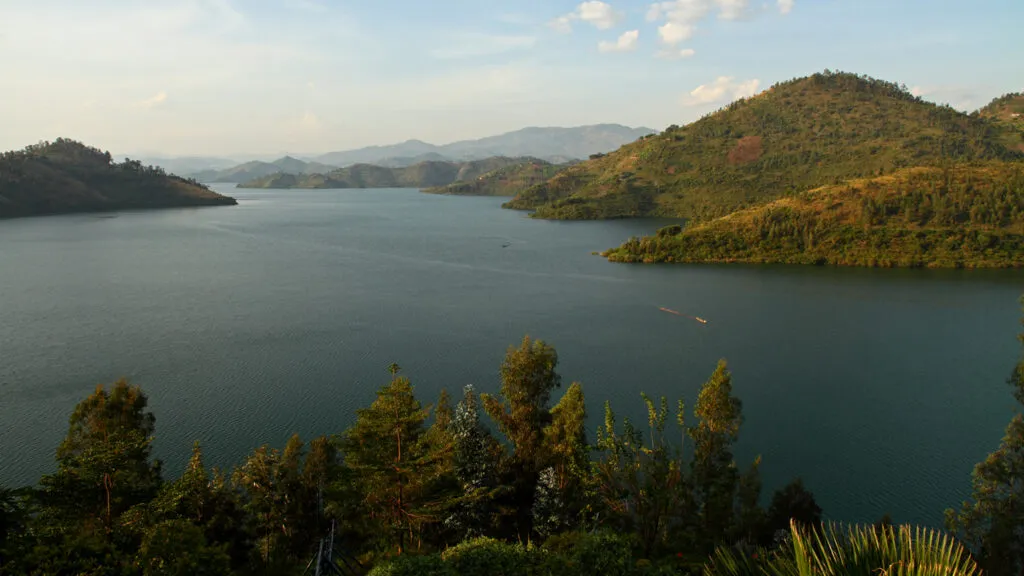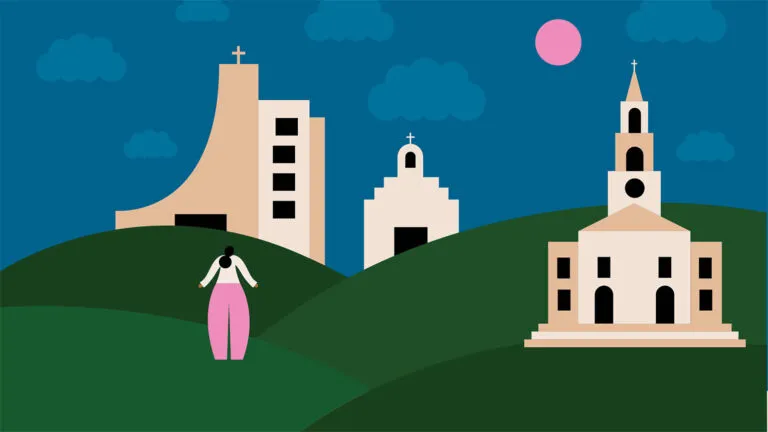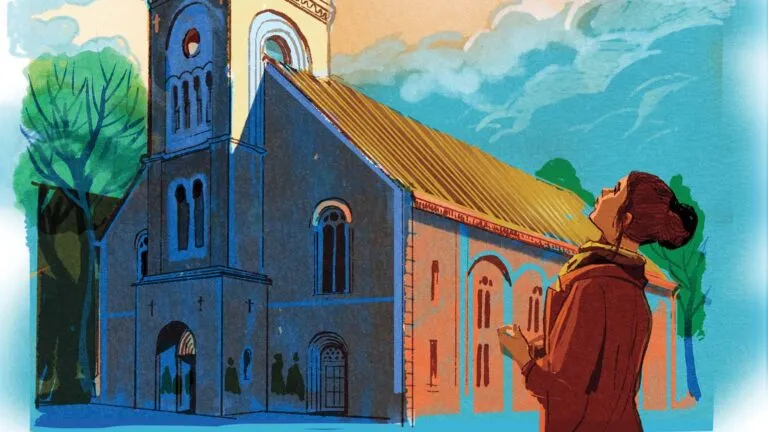Sometimes I sit on the beach not far from my home on Long Island and look out over the Atlantic, and I’m transported back to Lake Kivu, in Rwanda. There, my three brothers—Aimable, Damascene and Vianney—and I fished and sailed with our dad and swam with our friends. At night, we’d sit with our mother at the top of the hill, and marvel at the stars reflected in the lake’s still, crystalline surface. The lake was our life. Now, Kivu is known to many as the mass grave of thousands of people massacred in the ethnic genocide that swept my country in 1994.
Before the killing, we knew that in our country there were Hutu and there were Tutsi, but we were all Rwandans. I, a Tutsi, had many Hutu friends. We went to the same schools, attended the same churches and swam and played together in Lake Kivu. Then a vicious anti-Tutsi propaganda campaign, carried over radio airwaves, filled many Hutu with an ungodly hatred, and the Interahamwe militia set out to slaughter the entire Tutsi population. It didn’t take long for them to come to my region, near the city of Kibuye. My family urged me to run and seek shelter in the home of a local pastor. I hid with seven other women in a tiny bathroom in the Hutu pastor’s house, concealed behind a large wardrobe.
Many nights, we heard the mob surrounding the house, hunting for Tutsi. “We are looking for you, Immaculée Ilibagiza!” I heard a voice call out one night. Chills ran up my spine. I clutched the rosary my father had given me. They were hunting for me. I knew then that the rest of my family—except Aimable, who was studying abroad—had been killed. And when we emerged 91 days later from Pastor Murinzi’s bathroom, it was confirmed. My mother. My father. My darling brothers. We had been an incredibly close, loving family. And now they were gone—along with nearly one million of our fellow Rwandans, Hutu and Tutsi alike.
In those three months confined to Pastor Murinzi’s bathroom, I prayed and meditated. I gave myself over to God completely. Many nights in that cramped, dark place, I reflected on the beatitudes. Blessed are they who mourn: for they shall be comforted. Yes, God had comforted me. Blessed are the peacemakers: for they shall be called the children of God. If I survived the genocide, I told myself, I would strive to be a peacemaker.
After the war ended, I made my way to Kigali, Rwanda’s capital, and started working for the UN. But I couldn’t shake the sorrow that seized my heart whenever I envisioned how my family was murdered. Sometimes, I went for days with no sleep. My mind buzzed constantly with images of my family, images of our life together. Lord, I prayed, please release me from the nightmares that haunt my sleep and trouble my days.
Then one night I didn’t have a nightmare, but an amazingly vivid dream. I was in a helicopter flying over my family’s house, but I was trapped in a dark cloud. I could see Mom, Dad, Damascene and Vianney high above me in the sky, bathed in a warm, white light. The light spread across the sky until it engulfed the cloud hiding me. And, suddenly, I was with my family again. The dream was so real that I reached out and felt the warmth of my father’s skin, the gentleness of my mother’s touch. Damascene was wearing a crisp white shirt and blue trousers. He flashed me his brilliant smile. “Hey, Immaculée!” he called out. “You’ve been gloomy far too long and must stop all this crying. I know how much you miss us, but do you really want us to come back and suffer? We are at peace, in heaven. Now, you must heal your heart.” My family slowly receded into the sky until they disappeared into the heavens. I was still hovering over my house, but I was no longer in a dark cloud…and no longer in a helicopter. I was flying like a bird above my village, above the pastor’s house, above the forests and rivers and waterfalls of my beloved country.
The following morning, I woke up feeling calmer than I had in months. The pain I felt had not vanished, but it began to ease. I would always mourn and miss my family. How could I not? But by sending me that dream, God had shown me that my family was in a place beyond suffering. He’d also shown me that if I was ever to find peace in my heart again, I would have to return to my village. I did not know what I would do there, or if I would be able to bear it, but I understood that I had to go and face whatever had to be faced, confront evil where it had stood.
I went to the ruins of my family’s house to visit the graves of my mom and Damascene. I knelt and told them all that had happened since I’d last seen them. I told them about my job with the UN and what I planned to do in the future. I missed seeing their faces and hearing their voices, and I wept. And then it was time to do what I’d come to do: confront the leader of the gang who killed my mother and my brother.
I arrived at the prison late in the afternoon and was greeted by Semana, the new burgomaster of Kibuye. Semana had been a teacher before the genocide, a colleague and friend of my dad’s. He was like an uncle to me. Four of his six children had been killed in the slaughter. The war had transformed him, as it had so many others. His grief was palpable. His joy, vanished.
I put a hand on his shoulder. “Your little ones are with God,” I said softly.
“See how much the world has changed?” he said sadly. “The children must now comfort the parents.”
Semana was in charge of arresting and detaining the killers who had terrorized our area. He’d interrogated hundreds of Interahamwe and knew better than anyone which killers had murdered whom. “Do you want to meet the leader of the gang who killed your mother and Damascene?”
“Yes, sir, I do.” We had never learned for sure who had killed Dad and Vianney.
I watched through Semana’s office window as he crossed a courtyard to a cell and then returned, shoving a disheveled old man in front of him. I was startled as they approached, recognizing the man instantly. Felicien was a successful Hutu businessman whose children I’d played with in primary school. He’d been a tall, handsome man who wore expensive suits and had impeccable manners. I shivered when I suddenly realized it had been his voice I’d heard calling my name when the killers searched for me at the pastor’s.
Semana pushed Felicien into the office. He stumbled onto his knees. When he looked up from the floor and saw me, he quickly shifted his gaze and stared at the floor. “Explain to Immaculée why her family is dead. Explain to her why you murdered her mother and butchered her brother,” Semana shouted. “Get up and tell her!” The man remained hunched. He couldn’t face me. His tattered clothing hung from his emaciated frame, his skin sallow and bruised. His face was hidden beneath a filthy beard, his bare feet covered in open sores. He was broken.
“He looted your parents’ home and robbed your family’s plantation. We found your dad’s farm machinery at his house. After he killed your mother and Damascene, he kept looking for you. He wanted to kill you too. Didn’t you, Felicien?”
Felicien didn’t answer. He, too, had become the victim of his hatred. Unexpectedly, I wept at seeing his suffering. Semana looked at me, stunned by the tears streaming down my face. He grabbed Felicien and hauled him to his feet. “What do you have to say to Immaculée?”
Felicien sobbed. I could feel his shame. He looked up at me for only a moment, but our eyes met. I reached out, touched his hands lightly and said, “I forgive you.” That, I suddenly understood, was why God had led me back to my village with a dream.
Semana pushed Felicien out the door. Two soldiers yanked him up by his armpits and dragged him back toward his cell. When Semana returned, he was furious. “What was that about, Immaculée? That was the man who murdered your family. I brought him to you to question…to spit on if you wanted to. But you forgave him! How could you?”
“Forgiveness is all I have to offer.” It was true: I did not feel hatred. I did not seek revenge. In my heart, I understood that even the killers were part of God’s family, and I could honor God only by forgiving. This was how to be a peacemaker.
I have made a new home here in America, with a wonderful husband and two children. But I can never fully leave Rwanda. Now, when I watch the waves wash over the Long Island coastline and think of my family by the shores of Lake Kivu, I feel waves of forgiveness wash over me—consoling me. There is still so much pain in the hearts of my people, pain I want to help ease. When I take my children to Rwanda, we visit the children orphaned by the genocide. My prayer for them is that they will be loved and will give love in a beautiful and beloved country that is slowly, steadily starting to heal.





